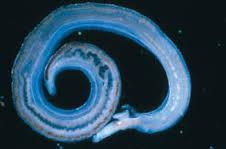Although schistosomiasis or bilharzia kills almost half a million people per year, to date there are only drugs available to treat the disease but not to prevent re-infection. Making the development of a prophylactic vaccine a necessity. This study describes an immunomics approach to the discovery of vaccine antigens. The emerging field of immunomics enables the determination of an “antibody signature” to a pathogen proteome for both resistant and susceptible individuals. In order to do this, the study constructed a protein microarray for the multi-cellular pathogen and probed it with sera from naturally resistant versus susceptible individuals from a high transmission area. Using multi-dimensional cluster analysis, the study showed that resistant individuals mounted a distinct and robust IgG1 antibody signature to a small set of newly discovered and well-characterized surface antigens in contrast to infected individuals. Concluding that this antigen discovery strategy allows for identification of several potentially protective and safe schistosomiasis vaccine antigens.












